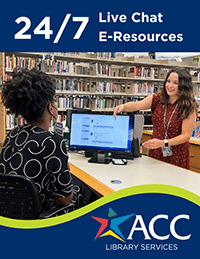1.1 Materials Considered for Acquisition
- The following list generally describes what ACC LS currently collects:
- Materials that are directly college-level curriculum-related and support one or more programs in the Areas of Study or Continuing Education
- Materials needed to complete class assignments
- Materials to support student research
- Supplemental materials
- Reference materials
- Serials
- Bibliographic tools
- General interest materials
- Specific examples of materials ACC LS currently collects:
- College-level print books for circulation
- College-level print books for reference
- College-level eBooks for circulation
- College-level eBooks for reference
- College-level print periodicals (e.g. journals, magazines and newspapers)
- College-level online periodicals (e.g. journals, magazines and newspapers)
- Streaming media - (e.g. Kanopy, Films on Demand, Swank)
- DVDs
- Blu-rays
- Online databases (e.g. Academic Search Complete, JSTOR, Gale eBooks)
- CDs (spoken word)
- 3-D models - may be purchased for library use only
- CD-ROMs (stand alone)
- Digital image collections - collection housed on vendor server
- Globes and maps - may be purchased for library use only
1.2 Materials Not Considered for Acquisition
- The following generally describes what ACC LS does not currently collect:
- Materials which are not directly college-level curriculum-related and do not support one or more current programs in the Areas of Study or Continuing Education.
- Materials which are cost prohibitive and cannot be accessed by all ACC Library Services users.
- The Library does not store or maintain a repository of out-of-date or low-use materials which no longer support the current college-level curriculum.
- Specific examples of materials ACC LS does not currently collect:
- Required textbooks
- Single-use texts (lab manuals or workbooks)
- Special research collections
- Research materials beyond the needs of undergraduate college students
- Rare materials
- Cost-prohibitive materials
- Foreign language materials, except those that support ACC language classes
- Out-of-print materials
- Middle school or high school level materials
- Course development/curriculum design resources
- Class sets (multiple copies of a text to support all students enrolled in a section or course)
- Audiobooks (standalone MP3 or streaming title)
- Audiocassettes
- Music (CDs, cassettes, vinyl, or digital)
- Digital/video games
- Slides
- Streaming Media (streaming digital copies of individual titles that are not part of a collection or database)
- Videocassettes
- Microfiche and microfilm
- Brochures
- Looseleaf texts
- Archival/historical materials pertaining to the college
- Instructor copies
- Advance reading copies
2.1 Early College High School/Dual Credit Programs
ACC’s Early College High School (ECH) and Dual Credit (DC) students are, by definition, enrolled both in Austin Community College and in a high
school program somewhere in the ACC high school area. These students might be at ECH high schools that are located on ACC campuses; on high school
campuses that offer DC; in K-12 ECH high schools and in high school charter programs; in both private and public environments; in person and/or
online; or in home school programs. ACC Library Services supports these students in ACC college-level coursework and, if they are enrolled in ACC,
they have full library privileges.
ACC LS does not have any roles or responsibilities to support these students in their high school programs/with high school assignments or in
their leisure reading programs, book clubs, or other programming. Nor does ACC follow any Children's Internet Protection Act technology protection
procedures required by K-12 environments, which receive federal support whether they are in public, private, or home-schooling situations. Instead,
these students are considered to be under the umbrella of FERPA (specifically the protection of school records), but for higher education, not K-12.
There are, however, a number of ACC LS activities for ECH/DC populations and programs regarding their high school “life,” including:
- ACC ECH/DC faculty librarians coordinate with area high school librarians to determine who assists students in their high school assignments so that we might provide appropriate referrals;
- The ACC LS Dean and ACC ECH/DC faculty librarians meet with the K-12 school library coordinators, their curriculum specialists, and tech support to identify possible issues and the processes that we need to follow to refer high school students and their teachers so students can get answers to high school curriculum questions;
- ACC ECH/DC faculty librarians partner with high school librarians to offer college-level information literacy so high school librarians can provide context for basic IL content possibly already covered; and
- ACC ECH/DC faculty librarians design LibGuides identifying our resources for college activities vs. high school resources they need to consult for their high school work.




